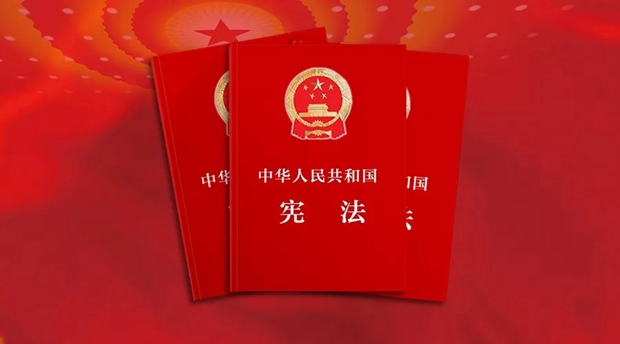A new era for the Chinese Constitution
- By Evandro Menezes de Carvalho
 0 Comment(s)
0 Comment(s) Print
Print E-mail China Today, March 19, 2018
E-mail China Today, March 19, 2018

China's Constitution [cnhubei.com]
The amendment to the Chinese Constitution passed in March by the National People's Congress prepares China for the decisive stage of its journey in pursuing its goal of building a moderately prosperous society by 2020 and a great modern socialist country by 2050. These are ambitious goals that will require a concentrated effort by the Chinese government and people to achieve them.
Constitutional changes are necessary when a country wants to update essential normative guidelines of the legal system or to improve the organization of state institutions in order to adapt them to the new circumstances in the domestic and international spheres.
President Xi Jinping, since taking office, has gradually accumulated and shaped a set of ideas and implemented some coherent government actions.
Since the 18th CPC National Congress, the CPC Central Committee has been implementing reforms to government institutions and functions and advancements in law-based governance, all in line with the four-pronged comprehensive strategy. Five years later, at the 19th CPC National Congress held in October last year, President Xi announced that "socialism with Chinese characteristics has entered a new era." This statement signifies an important stage in the contemporary history of China.
At the international level, China is now the world's second largest economy. By 2017, China contributed 30 percent of world economic growth - more than the U.S. At the domestic level, it is a more urban, more technological country, and the services sector contributes more than 50 percent of GDP. In short, China today is very different from 40 years ago when Deng Xiaoping initiated the policy of reform and opening-up. It is a more complex, sophisticated, and developed country with great ambitions and foreign policy objectives such as the Belt and Road Initiative. Thus, more than seeking to adapt to the world -- as was in the 1980s -- China is now an active player all over the world, creating new realities and being a protagonist in the 21st century. Thus, the "new era" inaugurates a new stage in China's history, with new challenges and new possibilities; and potentially, this new era can mean a new momentum for humankind's future.
Chinese law must follow this evolution of the nation's economy, society, facts, and goals. In other words, it must create the normative conditions for the realization of the "Chinese dream." Against this backdrop, the amendment to the Chinese Constitution seems to me, more than a natural consequence, but more of a necessity.
I closely followed the news from the Western media about the constitutional amendment in China. But, they preferred to focus on certain aspects of the reform. None of them underlined an essential fact: the change of the Chinese Constitution is a step towards the promotion of the rule of law.
We can mention, for example, the legal status of the supervision commissions as a national organ. This measure will promote the supervision of civil servants on a large scale, and will increase the fight against corruption, promoting a greater transparency in state action and providing better legal security for citizens.
The amendment also gives cities the legislative power to adopt local laws and regulations to broaden the instances of the legal system and creates the conditions for legal norms to be able to reflect the local needs and demands. The inclusion of "to direct and administer ecological advancement" as a new function of the State Council will influence the country's development path and the Chinese law. Such a constitutional amendment is a reflection of the Chinese government's commitment to international laws protecting the environment and fight against climate change.
The oath of allegiance to the Constitution by all state officials when assuming office is another aspect of the reform that has an undeniable symbolic value in reinforcing the perception of the relevance of the rule of law in the Chinese governance system.
And finally, it's worth mentioning the amendment of Article 79 of the Constitution of removing a provision from the Constitution which states that the president shall not hold office for more than two consecutive terms. This constitutional amendment has to be interpreted in conjunction with the CPC's leadership in China's governance. This last amendment reinforces the idea that the Party leads the nation towards development goals. And from this perspective, a "centralized and unified leadership," with President Xi at the core, is consistent with the Chinese governance model.
It makes sense. It seems to me that the main purpose of the modification is to ensure the continuity of government strategy and policies in this "new age." And they are strategies and policies that require long-term implementation.
In a world full of uncertainty and Western leadership weakened by the economic crisis, corruption or other internal conflicts, a powerful and stable China can be a great advantage to the Chinese nation, and can also guarantee the stability of the international system in the first half of the 21st century. It is this overall understanding of social, political, and economic facts that one can have a more accurate understanding of the significance of the Chinese constitutional amendment.
Evandro Menezes de Carvalho is chief executive editor of the Brazilian edition of China Today and a professor and head of the Brazil-China Center of the FGV Law School in Brazil.
Opinion articles reflect the views of their authors, not necessarily those of China.org.cn.






Go to Forum >>0 Comment(s)